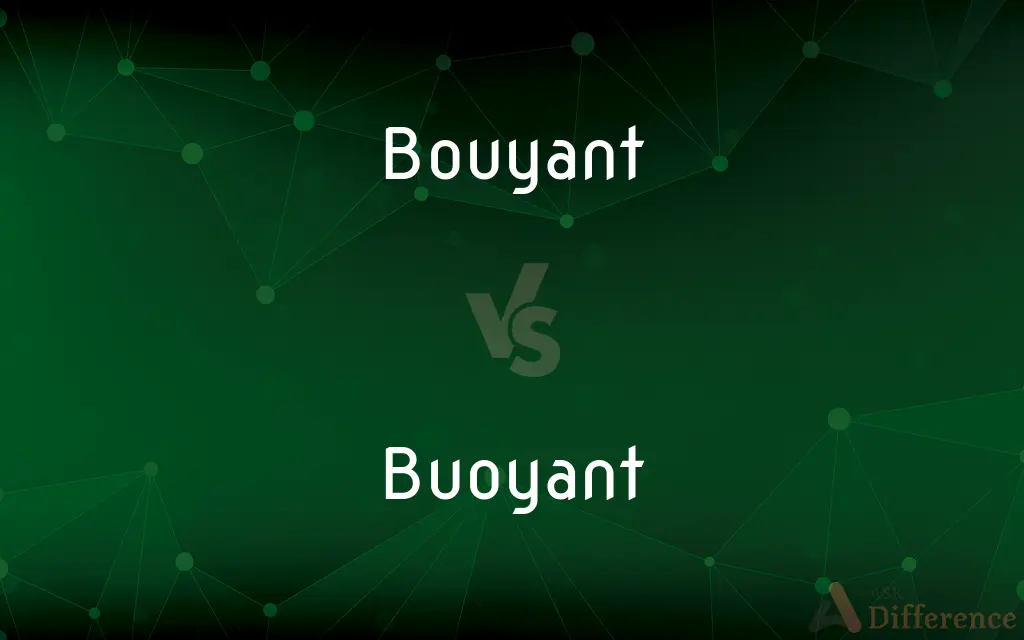Bouyant vs. Buoyant — Which is Correct Spelling?
By Tayyaba Rehman — Updated on March 28, 2024
"Bouyant" is an incorrect spelling, while "Buoyant" is the correct form. Buoyant describes something that floats or is cheerful in nature.

Table of Contents
Which is correct: Bouyant or Buoyant
How to spell Buoyant?

Bouyant
Incorrect Spelling

Buoyant
Correct Spelling
ADVERTISEMENT
Key Differences
Think of "buy" and then "ant" – when combined, they sound like "buoyant."
Visualize a buoy floating on the water to recall "buoyant."
Remember "buoy" as in the floating marker and just add "ant" – "buoyant."
Use mnemonics: "Be Usually Observant. Your Ant Naturally Floats" to recall "BUOYANT."
Associate "buoyant" with "float," both having an "o" after the "u."
ADVERTISEMENT
How Do You Spell Buoyant Correctly?
Incorrect: We need materials that are more bouyant for this project.
Correct: We need materials that are more buoyant for this project.
Incorrect: The boat was surprisingly bouyant despite its weight.
Correct: The boat was surprisingly buoyant despite its weight.
Incorrect: He wore a bouyant smile that lit up the room.
Correct: He wore a buoyant smile that lit up the room.
Incorrect: The bouyant market gave investors confidence.
Correct: The buoyant market gave investors confidence.
Incorrect: She felt incredibly bouyant after hearing the good news.
Correct: She felt incredibly buoyant after hearing the good news.
Buoyant Definitions
Buoyant means able to float in water or air.
The boat remained buoyant even after the heavy rain.
Buoyant implies being light-hearted and vivacious.
The child's buoyant laughter echoed in the room.
Buoyant means being resilient or not easily depressed.
He has a buoyant personality, always bouncing back from setbacks.
Buoyant refers to a cheerful and optimistic attitude or disposition.
Her buoyant mood lifted everyone's spirits.
Buoyant describes an economy or market condition showing positive growth or stability.
The stock market is buoyant today.
Able or tending to keep afloat or rise to the top of a liquid or gas.
Cheerful and optimistic
The conference ended with the party in a buoyant mood
(of an economy, business, or market) involving or engaged in much successful trade or activity
Car sales were buoyant
Having or marked by buoyancy
A buoyant balloon.
Buoyant spirits.
Lighthearted; gay
In a buoyant mood.
Having buoyancy; able to float.
(figuratively) Lighthearted and lively.
I’m in a buoyant mood.
Involving or engaged in much successful trade or activity.
Having the quality of rising or floating in a fluid; tending to rise or float; as, iron is buoyant in mercury.
Bearing up, as a fluid; sustaining another body by being specifically heavier.
The water under me was buoyant.
Light-hearted; vivacious; cheerful; as, a buoyant disposition; buoyant spirits.
Tending to float on a liquid or rise in air or gas;
Buoyant balloons
Buoyant balsawood boats
A floaty scarf
Characterized by liveliness and light-heartedness;
Buoyant spirits
His quick wit and chirpy humor
Looking bright and well and chirpy
A perky little widow in her 70s
Buoyant Meaning in a Sentence
Foam is often used in life vests because it's buoyant.
The child's buoyant laughter filled the entire house.
His buoyant mood made everyone around him feel happier.
The buoyant balloons rose quickly into the sky.
She remained buoyant even in the face of difficulties.
Buoyant personalities tend to be very infectious.
The ducklings are buoyant and float well on water.
The buoyant economy means more jobs are available.
She has a buoyant approach to solving problems.
The buoyant music lifted everyone's spirits.
Buoyant forces keep ships afloat on the sea.
Fish bladders help them to stay buoyant in water.
The festival had a buoyant atmosphere full of joy.
Buoyant demand led to an increase in production.
Buoyant materials are essential for making life rafts.
The buoyant melody had everyone tapping their feet.
Their spirits were buoyant after the team's victory.
The buoyant raft carried them safely across the river.
He designed a buoyant device for emergency evacuations.
A buoyant object can float on water.
A buoyant attitude can help you overcome obstacles.
A buoyant market is good for investors.
Their buoyant optimism was contagious.
The buoyant fabric is used for water sports gear.
Her buoyant nature makes her a great leader.
Buoyant Idioms & Phrases
Buoyant spirits/mood
Being in a happy, optimistic mood.
Despite the rain, the picnic went ahead in buoyant spirits.
A buoyant personality
A person who is naturally cheerful and optimistic.
His buoyant personality makes him well-liked by his peers.
Keep someone buoyant
To keep someone feeling happy and confident.
Her encouraging words kept him buoyant during hard times.
A buoyant market/economy
A market or economy that is doing well, with prices rising.
The new technology sector is particularly buoyant this year.
Stay buoyant
To remain optimistic or resilient in challenging situations.
She managed to stay buoyant even after losing her job.
Buoyant enthusiasm
Showing a lot of excitement and eagerness.
The team's buoyant enthusiasm was evident in their performance.
Buoyant demand
When demand for a product or service is high and rising.
There's a buoyant demand for electric vehicles nowadays.
A buoyant attitude
An approach to life that is optimistic and positive.
His buoyant attitude has helped him overcome many challenges.
Make the spirits buoyant
To make someone feel uplifted and happy.
The surprise party made her spirits buoyant.
Buoyant expectations
Anticipating positive outcomes or future success.
The buoyant expectations of the investors led to increased stock market activity.
Common Curiosities
What is the verb form of Buoyant?
The verb form related to "buoyant" is "buoy."
Why is it called Buoyant?
It's called "buoyant" because it derives from "buoy," which means to keep afloat.
Which preposition is used with Buoyant?
Common prepositions used with "buoyant" include "in" or "with."
What is the root word of Buoyant?
The root word is "buoy."
Which article is used with Buoyant?
Both "the" and "a" can be used with "buoyant," depending on the context.
Is Buoyant an abstract noun?
No, buoyant is an adjective and not an abstract noun.
What is the pronunciation of Buoyant?
Buoyant is pronounced as BOY-ant.
Which vowel is used before Buoyant?
The vowel "u" is used before "buoyant."
What is the singular form of Buoyant?
Buoyant is an adjective and does not have a singular or plural form.
Is Buoyant a negative or positive word?
Buoyant generally has a positive connotation.
Is Buoyant an adverb?
No, buoyant is not an adverb.
Is Buoyant a countable noun?
Buoyant is not a noun, so it's not countable.
How do we divide Buoyant into syllables?
Buoy-ant.
What is a stressed syllable in Buoyant?
The stressed syllable is "buoy."
What is another term for Buoyant?
Another term for buoyant is "resilient" or "floatable."
What is the opposite of Buoyant?
The opposite of buoyant is "sinking" or "depressed" (context-dependent).
What is the plural form of Buoyant?
Adjectives don't have plural forms. So, it remains "buoyant."
Which conjunction is used with Buoyant?
There isn't a specific conjunction exclusive to "buoyant." It depends on the sentence context.
Is Buoyant a vowel or consonant?
Buoyant is a word, not a single letter, so it contains both vowels and consonants.
Is Buoyant a collective noun?
No, buoyant is an adjective, not a collective noun.
Is the Buoyant term a metaphor?
No, "buoyant" is not a metaphor, but it can be used metaphorically.
How many syllables are in Buoyant?
Buoyant has two syllables.
What part of speech is Buoyant?
Buoyant is an adjective.
What is the first form of Buoyant?
As buoyant is an adjective, it doesn't have verb forms. The related verb is "buoy."
Is Buoyant a noun or adjective?
Buoyant is an adjective.
What is the third form of Buoyant?
The related verb "buoy" has "buoyed" as its past participle.
How is Buoyant used in a sentence?
"Despite the challenges, she remained buoyant and hopeful."
Is the word Buoyant is imperative?
No, "buoyant" is not imperative.
Which determiner is used with Buoyant?
Determiners like "the," "this," or "that" can be used with "buoyant."
What is the second form of Buoyant?
The related verb "buoy" has "buoyed" as its past tense.
Share Your Discovery

Previous Comparison
Bulliten vs. Bulletin
Next Comparison
Aand vs. AndAuthor Spotlight
Written by
Tayyaba RehmanTayyaba Rehman is a distinguished writer, currently serving as a primary contributor to askdifference.com. As a researcher in semantics and etymology, Tayyaba's passion for the complexity of languages and their distinctions has found a perfect home on the platform. Tayyaba delves into the intricacies of language, distinguishing between commonly confused words and phrases, thereby providing clarity for readers worldwide.














































